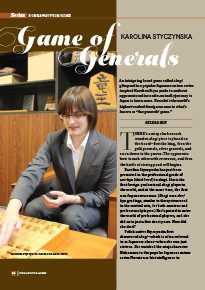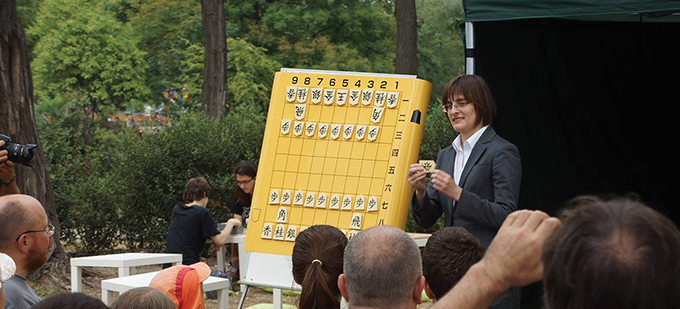Home > Highlighting JAPAN >Highlighting Japan November 2015>Home away from home
Highlighting JAPAN

Home away from home
Karolina Styczynska
Game of Generals
An intriguing board game called shogi glimpsed in a popular Japanese anime series inspired Karolina Styczynska to seek out opponents online and eventually journey to Japan to learn more. Now she’s the world’s highest-ranked foreign woman in what’s known as “the generals’ game.”

There’s a crisp clack as each wooden shogi piece is placed on the board—first the king, then the gold generals, silver generals, and so on down to the pawns. The opponents bow to each other with reverence, and then the battle of strategy and will begins.
Karolina Styczynska has just been promoted to the professional grade of san-kyu (third level) in shogi. She is the first foreign professional shogi player in the world, and at the same time, the first non-Japanese woman. (Shogi uses dan/kyu gradings, similar to the system used in the martial arts, for both amateur and professional players.) She’s poised to enter the world of professional players, and she did so in just a few short years. How did she do it?
Polish native Styczynska first discovered shogi—which is often referred to as Japanese chess—when she was just sixteen. She watched the ninja character Shikamaru in the popular Japanese anime series Naruto use his intelligence to strategize both in shogi and in ninja battle situations. Intrigued, Styczynska, already a chess player, looked into the game and discovered a place to play it online—the Polish game website PlayOK.
“Once I tried shogi on the Internet, I fell in love with it,” she recalls. “I began to play every day, every day.” She was especially interested in a crucial divergence from chess: the “drop rule,” which allows a player to use an opponent’s captured pieces as his or her own. She began to make friends, and soon started a shogi club in her hometown of Warsaw.
In 2010, a Japan-based website called 81 Dojo appeared that allowed people to play in real time. While playing on the site, Styczynska caught the attention of Madoka Kitao, one of the site’s founders and a professional shogi player. Impressed by Styczynska’s skill, Kitao invited her to Japan to play in 2011. Styczynska was immersed in the shogi world for two weeks, playing nonstop, which culminated in her beating a professional player at a female professional tournament. As a result, she was awarded the amateur yon-dan (fourth-level) grade.
Styczynska continued to play around Europe, including the Polish national championships and the European Shogi Championship, as well as the World Open Shogi Championship games, which are held concurrently. She was invited back to Japan in 2012 to play at the same tournament she’d joined the year before, and soon decided to move to Japan to continue her university studies and pursue her passion for shogi.
Styczynska now balances her courses in information management at Yamanashi Gakuin University with her Japanese studies and shogi activities, which include promoting the game back home in Poland and in the rest of Europe. In 2014, she won both the World Open and European Shogi championships, further garnering a Best Female Player distinction (which seems redundant, since she was the best overall player at both tournaments). In 2015, she attended a Japanese festival in Poland where shogi events were introduced, and also gave a speech and played several games at the Japanese Embassy in Warsaw.
Shogi has gained some popularity outside of Japan, and Styczynska wants to encourage more young people to play. Some competitors in their early teens have joined the World Open and European Shogi championships, which she thinks is a great development.
“This is a fun game,” Styczynska declares. “If you have fun, you can learn it easily. Of course, there is this aspect of losing, but if you don’t mind it and keep going, you will get strong at the game. Just remember about having fun.” Styczynska also hopes to write a shogi book for beginners in her native Polish, filling a need she sees back home. The book will contain some background cultural information, as well as a description of rules and game play and some sample games.
Styczynska cites shogi as a major force in her life. “If not for shogi I wouldn’t have learned Japanese, I wouldn’t be in Japan,” she says. “It seems simple, but actually it’s a big change. It’s the reason that I sit in this painful seiza position all day. If I don’t see shogi for a long time and then I do, it’s like, awww, I missed you! Call it love, if you want.”
Styczynska’s love of the game might just set up shogi’s next big move on the global game board.
© 2009 Cabinet Office, Government of Japan






